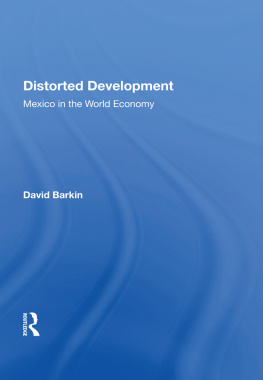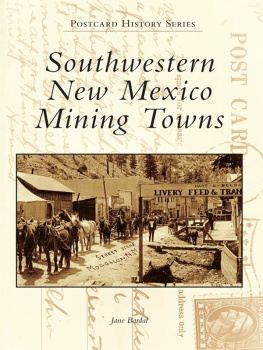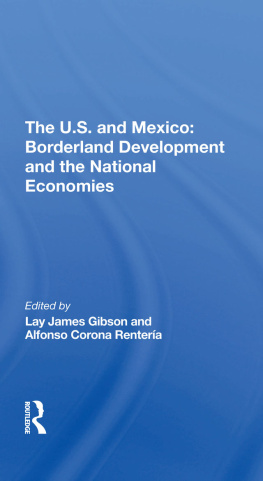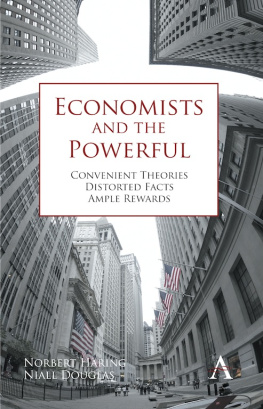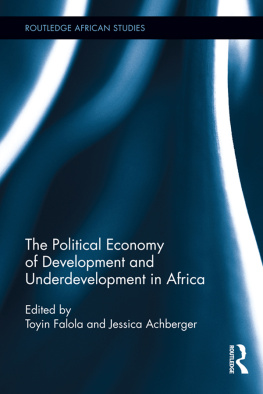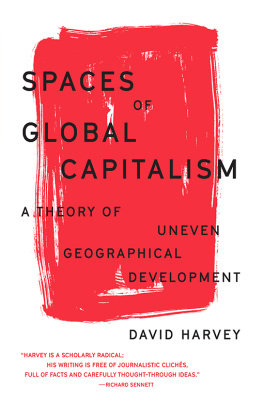Distorted Development
Series in Political Economy and Economic Development in Latin America
Series Editor
Andrew Zimbalist
Smith College
Distorted Development: Mexico in the World Economy, David Barkin
State and Capital in Mexico: Development Policy Since 1940, James M. Cypher
Central America: The Future of Economic Integration, edited by George Irvin and Stuart Holland
Struggle Against Dependence: Nontraditional Export Growth in Central America and the Caribbean, edited by Eva Paus
The Peruvian Mining Industry: Growth, Stagnation, and Crisis, Elizabeth Dore
Cuban Political Economy: Controversies in Cubanology, edited by Andrew Zimbalist
Rural Women and State Policy: Feminist Perspectives on Latin American Agricultural Development, edited by Carmen Diana Deere and Magdalena Len
The International Monetary Fund and Latin America: Economic Stabilization and Class Conflict, Manuel Pastor, Jr.
Available in hardcover and paperback.
First published 1990 by Westview Press
Published 2018 by Routledge
52 Vanderbilt Avenue, New York, NY 10017
2 Park Square, Milton Park, Abingdon, Oxon OX14 4RN
Routledge is an imprint of the Taylor & Francis Group, an informa business
Copyright 1990 by Taylor & Francis
All rights reserved. No part of this book may be reprinted or reproduced or utilised in any form or by any electronic, mechanical, or other means, now known or hereafter invented, including photocopying and recording, or in any information storage or retrieval system, without permission in writing from the publishers.
Notice:
Product or corporate names may be trademarks or registered trademarks, and are used only for identification and explanation without intent to infringe.
Library of Congress Cataloging-in-Publication Data
Barkin, David.
Distorted development : Mexico in the world economy / David
Barkin.
Germany / Joyce Marie Mushaben.
p. cm. (Series in political economy and economic
development in Latin America)
Includes bibliographical references and index.
ISBN 0-8133-7608-4
1. MexicoEconomic conditions1982 2. MexicoEconomic
conditions19701982. 3. MexicoEconomic policy1970
4. AgricultureEconomic aspectsMexico. 5. Debts, External
Mexico. 6. Economic stabilizationMexico. 7. Capital movements
Mexico. 8. SmugglingMexico. I. Title. II. Series.
HC135.B23 1990
330. 9720834dcZO
90-38501
CIP
ISBN 13: 978-0-367-01224-3 (hbk)
To
Sol and Elaine,
who made a better world
To
Benjamin and La Raxza;
the future is yours to change.
Like most scholarly works, this book is the individualized product of a collective experience. After more than a quarter of a century in Mexico, I have accumulated an enormous debt to colleagues and friends who have unstintingly given of their time, friendship, and insights to assist me in integrating myself into Mexico.
Over the course of these years, the flow of books written abroad into Mexico has turned into a virtual flood, heralding the crisis that finally arrived. Now, fifteen years since the onset of this crisis and in spite of the pious promises of renovated modernists, it appears that the crisis is here to stay, reshaping the country and once again excluding important groups of people who only recently had begun to enjoy some of the benefits of modernization. In observing and participating in the process, I enjoyed a unique opportunity and privileged position in Mexicos pantheon of intellectual luminaries at the very moment when the country reinstated one last burst of nationalistic political fervor.
A few people have been especially important and generous, joining me in the long trek but often choosing different paths, in their commitment to build a better tomorrow. The Universidad Autnoma Metropolitana was created with the promise of a different kind of education. We spent long hours trying to forge a structure that would allow us to realize this promise; I continue to share my dreams and frustrations with colleagues from those heady years, and the results of the collaboration are evident throughout this book: Carlos Rozo, Etelberto Ortiz, and innumerable others have contributed, each in his own fashion, to molding the arguments herein.
When Ivn Restrepo invited me to join him at the recently created Centro de Ecodesarrollo I did not dream that this would be the beginning of an enduring collaboration that still offers me the unique opportunity to explore the relationship between the evolving international economy and the local decisions in the most unexpected reaches of Mexicos rural society; in this enterprise, the very special collaborative relationship that I share with Blanca Surez has permitted us to produce a long series of studies, the results of which have influenced every section of this book.
Gustavo Estevas quixotic meanderings have not deterred him from championing the need to defend the integrity of people from cultures as diverse as those in his native Oaxaca and of the intellectual gurus from the philosophical world of Ivan Illich; over the years we have struggled in a comradely fashion and frequently managed to develop a common understanding of the fundamental problems oppressing Mexicans. Our joint undertakings have significantly altered both of our lives. Miguel Wionczek, a maverick scholar who always demanded rigor and honesty in our lengthy interchanges, left his indelible mark on my scholarship, in spite of the fact that we never finished writing our joint book. Billie DeWalt returned to Mexico in the early 1980s, taken with the promise of the theory of the internationalization of capital; as in this book, we are continuing to explore the implications of this approach for future developments throughout the Third World.
Even after the book was completed in my mind, however, a long road remained to be traveled. Andy Zimbalist went far beyond the duties of series editor to offer the support and encouragement that helped me to overcome the personal hurdles that popped up throughout the lengthy gestation period. Lucy Conger then stepped in to put her blue pencil to paper while urging me, at my moments of doubt sown by the evolving political scene in Mexico, to get on with the task. Of course, even after finishing the manuscript and sending it off, still other hurdles had to be overcome; in this process, the capable management of the production process by Martha Leggett and the perspicacious editing by Anna Huff transformed the text into a much more readable and consistent product.
Perhaps most telling, my move to Morelia wrought profound transformations. The personal and environmental factors that initiated that process sharpened my understanding of the potential latent in provincial Mexico and the lack of comprehension by official Mexico of this process. This move and the support and challenge offered by Blanca Lemus in the new surroundings made it possible for me to produce the present distillation of Mexicos economic history on the eve of its full integration into the world economy. I hope that the books promise of a different future is something we will all be able to enjoy.
David Barkin
Morelia, Michoacn
1
Introduction
While thinking about the shape of things to come, I imagined a Mexican leaders nightmare: What if the foreign creditors were magically to write off Mexicos external obligations?

